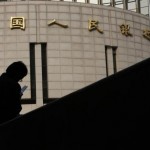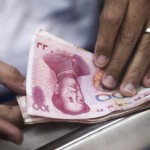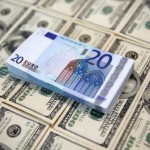Yuan gains credibility as reserve currency

France’s Credit Agricole Private Banking is advising its clients to add the Chinese yuan to their portfolios as the world’s second-largest economy looks to further liberalise its currency.
High net worth individuals in the Arabian Gulf region should consider the yuan because it is gaining prominence globally, said David Hall, the global head of foreign exchange and precious metals advisory at the private bank. “More and more governments are comfortable holding the Chinese currency and I think this is just the beginning of the story,” said Mr Hall.
“It is still some five to seven years from capital account convertibility, but inevitably the Chinese currency will gradually become a reserve currency for central banks.”
One of the key factors for the Chinese currency to become a reserve currency is linked to the IMF, which later this year will conduct a review that may lead to endorsing the yuan as a global reserve currency.
The IMF’s possibility of including the yuan in the so-called Special Drawing Rights (SDR), will put it on par with the euro, US dollar, Japanese yen and pound sterling, which currently make up the SDR basket.
“In the next 10 years the Chinese currency is the place that will offer stability, diversification, and potential appreciation,” said Mr Hall.
“China is less and less an export-driven economy and is starting to realise there are benefits from keeping a stable currency that can be an anchor currency in Asia.”
In March the yuan was the fifth most active currency for worldwide payments, accounting for 2.03 per cent of global payments, according to Swift, the financial messaging firm.
Its rank is higher than the Canadian and Australian dollar. Yuan payments rose in value by 33.5 per cent in March this year versus February.
China is GCC’s biggest trading partner and the biggest consumer of Gulf oil exports. Last year China overtook India as UAE’s largest trade partner.
The central banks of Qatar and the UAE have each signed a 35 billion yuan currency swap agreement with China that will help facilitate trade and investment.
The Gulf region remains apprehensive about using the yuan because all Gulf currencies are linked to the dollar except the Kuwaiti dinar, which is pegged to a basket of currencies.
But the appreciation of the dollar against other currencies is making the Gulf region an expensive place to do business and could contribute to the projected slowdown in the oil-exporting Gulf.
The dollar is overvalued and the euro is undervalued, according to Mr Hall.
“So this is where I think diversification is a theme that we need to embrace because on a relative basket basis the GCC currencies and the US dollar are overvalued today. And the overvaluation is causing lesser growth in this part of the region not only because of lower oil prices.”
Source: The national – Yuan gains credibility as reserve currency




























